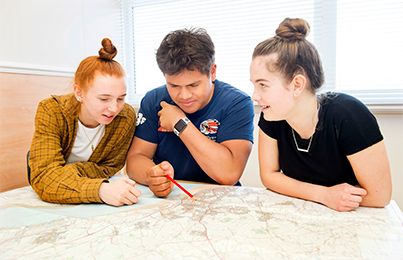Geography
- Course Overview
- Assessment & Examination
- Resources
- Prior Knowledge
- Beyond The Course
- Entry Requirements
Course Overview
In studying this course, you will explore the dynamics of both human and physical geography and how they interact over space and time. In physical geography, you will study the key processes that drive our atmospheric and land-related systems of water and carbon, and consequent changes to our rainforests, rivers and climates. You will also examine the dynamic nature of coastal systems, processes and landscapes and strategies to manage these. Finally, you will look at tectonic and climatic hazards, the origin and nature of these events, and how people respond to them.
In human geography, you will study the growth of key urban areas and environmental challenges posed to ensure cities are as sustainable as possible. There is a focus on changing places and how people's experiences shape their lives, behaviours and consequent geographies, including character of place and social, economic and demographic change. Finally, you will explore the broad dynamics of globalisation, with a particular focus on the impacts and responses to inequalities.
Assessment & Examination
You will sit three 2 hour examinations at the end of your two years of study. In addition, you will undertake your own independent investigation, based on one of your field trips:
- Paper 1 - Physical Geography - 2 hour 30 minute exam worth 40% of the total A Level.
- Paper 2 - Human Geography - 2 hour 30 minute exam worth 40% of the total A Level.
- Geographical Investigation - a 4000 word submitted fieldwork investigation worth 20% of the total A Level.
Resources
You will only need basic stationery and a calculator. However, there are a number of academic text books which are recommended reading and we would encourage you to purchase copies.
Prior Knowledge
It is preferable that you are already active in engaging with contemporary geographical issues and news stories across a wide range of media sources. You will also need to demonstrate good levels of competence in English (for producing extended responses) and Maths (for processing data and statistically testing for patterns).
Beyond The Course
Geography is well-regarded both employers and universities, and degrees in geography tend to specialise in human (BA) or physical (BSc) geography. Other degrees, such as Town and Country Planning or Marine Biology, also have strong connections with Geography.
The skills associated with this subject also provide strong foundations for many other careers, including conservation, coastal management, education, management, tourism, transport, and many more.
Entry Requirements
GCSE Level 6 in Geography.
Entry to Sixth Form also requires:
- GCSE Level 5 in English Language or English Literature;
- GCSE Level 5 in Maths;
- Four other GCSEs at Level 5, in addition to English and Maths.


